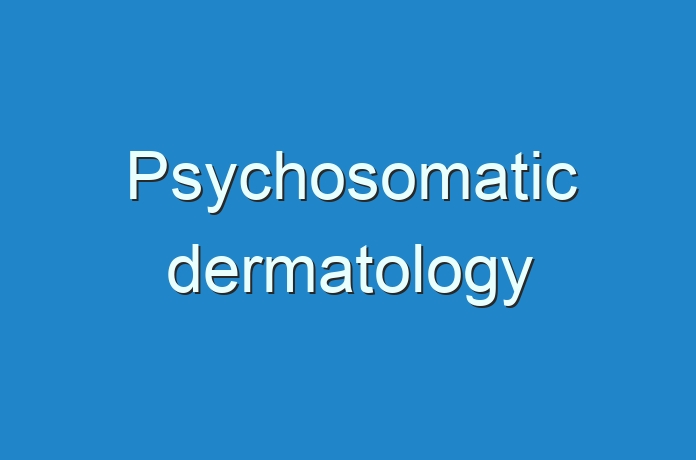
Skin and psyche are closely linked so that some skin diseases and allergies worsen due to stress or even appear for the first time. A specific health care service has been set up at various Dermatological Clinic since 1995, in which the special situation of people with skin diseases and the associated psychological conflicts can be addressed.

With many skin diseases, it is not easy in everyday life to deal with the often chronic changes and necessary dermatological treatments. Here it is important to learn to accept the skin diseases through special measures for processing the disease and to avoid possible psychosocial stress.
Some skin diseases only arise from psychological conflict situations. With acne, for example, a strong tingling can lead to unavoidable actions that require special behavioral measures, and there are also people who hurt themselves to indicate their psychological conflicts. Psychodermatology was also set up for this. Since 2013, special skin diseases that have been a focus of psychosomatic dermatology have also been identified as psychodermatological. This is the skin picking syndrome (compulsive or impulsive tingling of the skin) and the body dysmorphic disorder (fear of disfigurement).
In the case of inpatient treatments in the dermatology clinic, the psychosomatic consular service is switched on, in which a diagnostic interview is offered in order to show and discuss further treatment options with dermatologist consultant. A special consultation hour has been set up for people with skin cancer, which can be reached via the tumor outpatient clinic or arranged directly in the psychosomatic outpatient clinic. People also contact psychodermatologist U.K.
Dermatologists, who are also specialists in psychosomatic medicine or psychologists with a license to practice as a psychological psychotherapist and special knowledge in skin. Other doctors and psychologists are also involved in the replacement, but they also have good knowledge of skin diseases!

Interlink of body and Soul
Someone has a “thick skin”, “blushes with shame” or “something doesn’t itch”. Many idiomatic expressions make it clear that the skin has a lot to do with sensations and is more than just the shell of a body, which protects against bacteria and other external influences. Hippocrates (460 to 370 BC) reported that fear could lead to sweating. The interactions between skin and nerves are not surprising: in embryonic development, both tissues emerge together from a so-called cotyledon, the ectoderm, and thus have parallels in developmental history. Recent studies in the field of neuroimmunology and psychoendocrinology show how close the connection between skin, brain, and nerves is.
The skin is also able to cause inflammatory processes in itself via nerve messengers and stress hormones. A lot of attention has been paid to the skin since time immemorial. Incense and milk masks were popular against wrinkles since ancient times. Countless books and care products today give tips for beautiful, non-aging skin. Touch, closeness, contact with things or people: the skin is the central element in social interaction. If it is intact and you feel comfortable in it, the self-esteem is usually correct. However, if it is damaged or even disfigured, this is perceived as disturbing or stigmatizing. For every visible red spot on the face and hands are rarely considered beauty marks. People living with chronic skin disease from birth know.
Consequence and Cause
Sick skin can put a person under stress. But there is also the other side: that stress only triggers a skin disease. The question of whether psychological problems are the cause or result of skin diseases is, according to Professors and U.K. Dermatologists is not that important. It is more important to recognize the interplay between skin and psyche and to understand the language of the skin, according to the specialist for dermatology like U.K. dermatologist. Around eight percent of the population suffers from neurodermatitis and psoriasis.
Dermatology can be influenced psychologically
Psychosomatic dermatology such as neurodermatitis, psoriasis, urticaria, acne or vitiligo are genetically designed but can be influenced psychologically. For example, with hives, stressful, exciting experiences revealed wheals on the skin almost immediately afterwards. Every fourth person had such a reaction at least once in their life. Pustules, pimples and eczema are no less of a burden to those affected than diseases such as diabetes or rheumatism, according to the results of studies on the general quality of life. The expectation of being rejected by other people because of their appearance plays a major role in this. It is therefore crucial for the patient and therapist to recognize which current feelings, but also past life events, have an effect on a dermatosis. In many cases, the diseases could be influenced positively.





